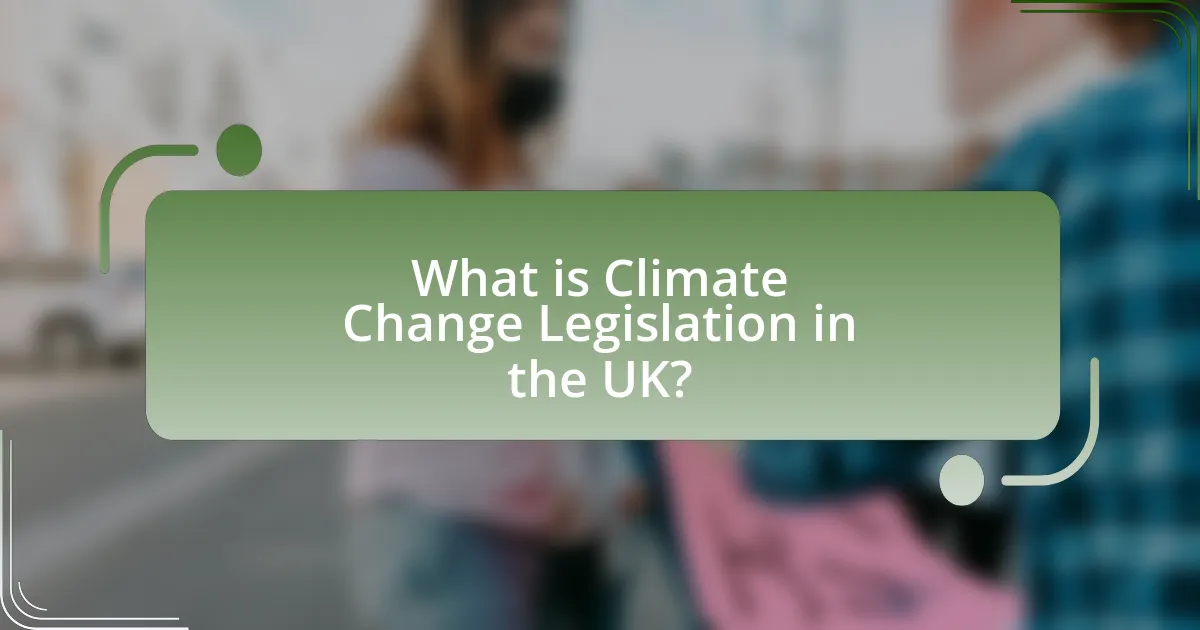Climate Change Legislation in the UK encompasses a series of laws and policies designed to mitigate greenhouse gas emissions, with the Climate Change Act 2008 serving as its foundation. This legislation establishes legally binding targets, including a commitment to achieve net-zero emissions by 2050, and mandates interim carbon budgets to ensure accountability. The article evaluates the effectiveness of these legislative measures, the role of the Committee on Climate Change, and the challenges faced in transitioning to a low-carbon economy. It also discusses the economic implications, social and political barriers, and the influence of public opinion on climate policy decisions, providing insights into the UK’s approach and its potential lessons for other nations.

What is Climate Change Legislation in the UK?
Climate Change Legislation in the UK refers to a series of laws and policies aimed at reducing greenhouse gas emissions and addressing climate change. The cornerstone of this legislation is the Climate Change Act 2008, which established legally binding targets for reducing emissions by at least 80% by 2050 compared to 1990 levels. This act also created the Committee on Climate Change, an independent body tasked with advising the government on emissions targets and progress. In 2019, the UK government amended the act to commit to reaching net-zero emissions by 2050, reinforcing its commitment to climate action.
How does the UK define its commitment to Net Zero?
The UK defines its commitment to Net Zero as a legally binding target to reduce greenhouse gas emissions to net zero by 2050. This commitment is enshrined in the Climate Change Act 2008 (2050 Target Amendment) Order 2019, which mandates that the UK must balance the amount of greenhouse gases emitted with the amount removed from the atmosphere. The UK government has also set interim carbon budgets to ensure progress towards this goal, aiming for a 68% reduction in emissions by 2030 compared to 1990 levels.
What are the key targets set by the UK government for Net Zero?
The UK government has set a key target to achieve Net Zero greenhouse gas emissions by 2050. This legally binding commitment, established under the Climate Change Act 2008 (as amended in 2019), mandates that the UK reduces its emissions to net zero across all sectors of the economy. Additionally, interim targets include a reduction of at least 68% in emissions by 2030 compared to 1990 levels, as outlined in the UK’s Nationally Determined Contribution under the Paris Agreement. These targets are supported by policies aimed at transitioning to renewable energy, enhancing energy efficiency, and promoting sustainable transport.
How does the UK’s Net Zero target compare to international standards?
The UK’s Net Zero target, set for 2050, aligns with international standards established by the Paris Agreement, which aims to limit global warming to well below 2 degrees Celsius. This commitment is more ambitious than many countries, as the UK has legally enshrined its target, making it one of the first major economies to do so. In comparison, several nations, including the United States and China, have set less stringent targets or lack legally binding commitments. The UK’s approach includes comprehensive policies and strategies to reduce greenhouse gas emissions, demonstrating leadership in climate action on the global stage.
Why is Climate Change Legislation important for the UK?
Climate Change Legislation is important for the UK because it establishes a legal framework to reduce greenhouse gas emissions and promote sustainable practices. This legislation is crucial for meeting the UK’s legally binding target of achieving net-zero emissions by 2050, as outlined in the Climate Change Act 2008. The Act mandates the government to set carbon budgets, which limit the total amount of greenhouse gases the UK can emit over a five-year period, ensuring accountability and progress towards climate goals. Additionally, effective legislation drives investment in renewable energy and green technologies, fostering economic growth while addressing climate change.
What are the potential impacts of climate change on the UK?
Climate change is expected to have significant impacts on the UK, including increased flooding, rising sea levels, and more frequent heatwaves. The UK Climate Change Risk Assessment 2017 highlights that by 2050, the frequency of extreme weather events could increase, leading to greater risks for infrastructure and public health. Additionally, the Met Office projects that average temperatures in the UK could rise by 1.5 to 2 degrees Celsius by the end of the century, exacerbating heat-related health issues and affecting agriculture. These changes threaten biodiversity, with species migration patterns disrupted and habitats altered, as noted in the UK Biodiversity Indicators 2020 report.
How does legislation influence public and private sector actions?
Legislation significantly influences public and private sector actions by establishing legal frameworks that dictate operational standards and responsibilities. For instance, the UK’s Climate Change Act of 2008 set legally binding carbon reduction targets, compelling both sectors to adopt sustainable practices and invest in low-carbon technologies. This act has led to the implementation of various policies, such as the Renewable Energy Directive, which mandates a shift towards renewable energy sources, thereby driving innovation and investment in the private sector while ensuring public sector accountability in meeting climate goals.
What are the main components of the UK’s Climate Change Act?
The main components of the UK’s Climate Change Act include legally binding carbon budgets, a target to achieve net-zero greenhouse gas emissions by 2050, and the establishment of the Committee on Climate Change. The Act mandates the government to set carbon budgets that limit emissions over five-year periods, ensuring a gradual reduction in greenhouse gases. The net-zero target, established in 2019, requires the UK to balance the amount of greenhouse gases emitted with the amount removed from the atmosphere by 2050. The Committee on Climate Change provides independent advice and monitors progress towards these targets, ensuring accountability and transparency in the UK’s climate strategy.
What role does the Committee on Climate Change play?
The Committee on Climate Change (CCC) plays a crucial role in advising the UK government on climate policy and progress towards net-zero emissions. Established under the Climate Change Act of 2008, the CCC provides independent assessments of the government’s climate targets and strategies, ensuring they are based on scientific evidence and aligned with the UK’s legally binding carbon budgets. The CCC’s annual reports and recommendations guide policymakers in implementing effective measures to reduce greenhouse gas emissions, thereby supporting the UK’s commitment to achieving net-zero by 2050.
How are carbon budgets established and enforced?
Carbon budgets in the UK are established through a legally binding framework set by the Climate Change Act of 2008, which mandates the government to set carbon budgets that limit greenhouse gas emissions over five-year periods. The Committee on Climate Change (CCC) plays a crucial role in advising the government on the appropriate level of these budgets based on scientific evidence and climate targets, ensuring that they align with the goal of achieving net-zero emissions by 2050.
Enforcement of carbon budgets is achieved through a combination of government accountability and reporting mechanisms. The UK government is required to report annually on its progress towards meeting the carbon budgets, and the CCC assesses this progress. If the government fails to meet its targets, it must outline policies to address the shortfall, ensuring that there are consequences for non-compliance. This structured approach, backed by legal requirements, creates a robust system for establishing and enforcing carbon budgets in the UK.

What challenges does the UK face in achieving Net Zero?
The UK faces significant challenges in achieving Net Zero, primarily due to reliance on fossil fuels, infrastructure limitations, and public acceptance. The country’s energy sector still heavily depends on natural gas and oil, which complicates the transition to renewable energy sources. Additionally, the existing infrastructure for energy distribution and transportation requires substantial upgrades to accommodate low-carbon technologies. Public acceptance is also a hurdle, as there is often resistance to changes such as increased energy costs or the implementation of new technologies. According to the UK Climate Change Committee, achieving Net Zero by 2050 will require a comprehensive strategy that addresses these challenges through policy reforms, investment in green technologies, and public engagement initiatives.
What are the economic implications of transitioning to Net Zero?
Transitioning to Net Zero has significant economic implications, including potential job creation in renewable energy sectors and the need for substantial investment in green technologies. The International Renewable Energy Agency (IRENA) estimates that the global transition to renewable energy could create 24 million jobs by 2030, highlighting the potential for economic growth. However, this transition also requires an estimated $2.4 trillion annual investment in renewable energy and energy efficiency to meet climate goals, which could strain public and private finances. Additionally, industries reliant on fossil fuels may face job losses and economic disruption, necessitating targeted retraining programs to mitigate these impacts. Overall, while the transition to Net Zero presents opportunities for economic advancement, it also poses challenges that require careful management and investment.
How will job markets be affected by climate policies?
Climate policies will significantly reshape job markets by creating new employment opportunities in renewable energy sectors while simultaneously leading to job losses in fossil fuel industries. For instance, the UK government’s commitment to achieving net-zero emissions by 2050 is projected to generate up to 400,000 jobs in green sectors such as wind and solar energy by 2030, according to the UK’s Climate Change Committee. Conversely, jobs in coal, oil, and gas extraction are expected to decline, with estimates suggesting a reduction of around 200,000 jobs in these sectors as the economy transitions to cleaner energy sources. This dual impact highlights the necessity for workforce retraining and adaptation strategies to mitigate the effects of job displacement while capitalizing on emerging opportunities in sustainable industries.
What are the costs associated with implementing Net Zero strategies?
The costs associated with implementing Net Zero strategies can range from significant initial investments to ongoing operational expenses. For instance, transitioning to renewable energy sources, such as wind and solar, often requires substantial capital for infrastructure development, estimated at around £50 billion annually in the UK according to the Committee on Climate Change. Additionally, retrofitting buildings for energy efficiency and investing in electric vehicle infrastructure contribute to these costs, which could total over £1 trillion by 2050. These figures highlight the financial implications of achieving Net Zero targets while also emphasizing the potential for long-term savings and economic benefits through job creation and reduced energy costs.
What social and political barriers exist in the UK regarding climate legislation?
Social and political barriers in the UK regarding climate legislation include public skepticism about climate change, political party divisions, and economic concerns. Public skepticism is evidenced by surveys indicating that a significant portion of the population questions the urgency of climate action, which can hinder support for robust legislation. Political party divisions manifest in differing priorities, with some parties prioritizing economic growth over environmental regulations, leading to inconsistent policy approaches. Economic concerns arise from fears of job losses in traditional industries, such as fossil fuels, which can create resistance to transitioning to greener alternatives. These barriers collectively impede the implementation of effective climate legislation aimed at achieving the UK’s net-zero targets.
How do public opinions influence climate policy decisions?
Public opinions significantly influence climate policy decisions by shaping the priorities and actions of policymakers. When a substantial portion of the public expresses concern about climate change, elected officials often respond by advocating for more stringent environmental regulations and initiatives. For instance, surveys indicate that in the UK, over 70% of the population supports government action on climate change, which has led to commitments such as the legally binding target to achieve net-zero greenhouse gas emissions by 2050. This public support creates political pressure that compels policymakers to align their agendas with the electorate’s preferences, thereby directly impacting the formulation and implementation of climate policies.
What role do political parties play in shaping climate legislation?
Political parties play a crucial role in shaping climate legislation by influencing policy priorities, legislative agendas, and public discourse on environmental issues. For instance, in the UK, the Conservative Party has historically focused on market-driven solutions to climate change, while the Labour Party advocates for more regulatory approaches and public investment in green technologies. This ideological divide affects the formulation and implementation of climate policies, as seen in the differing approaches to the UK’s net-zero targets established in the Climate Change Act 2008, which was supported by a cross-party consensus but has faced challenges based on party positions in subsequent years. Additionally, political parties mobilize public support and engage in negotiations that can lead to significant legislative outcomes, such as the UK’s commitment to reducing greenhouse gas emissions by 68% by 2030, reflecting the influence of party platforms on climate action.
How is the effectiveness of the UK’s Climate Change Legislation evaluated?
The effectiveness of the UK’s Climate Change Legislation is evaluated through a combination of legally mandated carbon budgets, independent assessments by the Climate Change Committee (CCC), and progress reports submitted to Parliament. The UK government is required to set legally binding carbon budgets that limit greenhouse gas emissions over five-year periods, ensuring accountability and transparency in meeting climate targets. The CCC conducts regular evaluations and provides recommendations based on progress towards these budgets, utilizing data on emissions reductions and policy effectiveness. For instance, the CCC’s 2021 report highlighted that the UK is on track to meet its 2030 emissions reduction target, demonstrating the legislative framework’s effectiveness in driving climate action.
What metrics are used to assess progress towards Net Zero?
Metrics used to assess progress towards Net Zero include greenhouse gas emissions inventories, carbon intensity measures, and renewable energy adoption rates. Greenhouse gas emissions inventories track total emissions across sectors, providing a comprehensive view of progress. Carbon intensity measures evaluate emissions per unit of energy produced, indicating the efficiency of energy sources. Renewable energy adoption rates reflect the percentage of energy generated from renewable sources, demonstrating the transition away from fossil fuels. These metrics collectively inform policymakers and stakeholders about the effectiveness of strategies aimed at achieving Net Zero targets.
How are emissions reductions measured and reported?
Emissions reductions are measured and reported through standardized methodologies that quantify greenhouse gas emissions and track changes over time. The UK utilizes the Greenhouse Gas Protocol, which provides a framework for measuring and reporting emissions across various sectors, ensuring consistency and transparency. Additionally, the UK government publishes annual greenhouse gas inventories that detail emissions data, including sources and reductions achieved, which are verified by independent bodies to ensure accuracy. This systematic approach allows for the assessment of progress towards net-zero targets, as outlined in the Climate Change Act 2008 and subsequent legislation.
What benchmarks are set for evaluating legislative success?
Benchmarks for evaluating legislative success in the context of climate change legislation include the achievement of specific emissions reduction targets, the implementation of policies that promote renewable energy adoption, and the establishment of regulatory frameworks that facilitate sustainable practices. For instance, the UK’s commitment to net zero by 2050 sets a clear emissions reduction target, while the Climate Change Act mandates regular assessments of progress. Additionally, the effectiveness of financial investments in green technologies and the engagement of stakeholders in policy development serve as critical indicators of legislative success. These benchmarks are essential for measuring the impact and effectiveness of climate-related laws and policies.
What lessons can be learned from the UK’s approach to climate legislation?
The UK’s approach to climate legislation demonstrates the importance of legally binding targets and comprehensive frameworks for achieving net-zero emissions. The Climate Change Act of 2008 established a legally binding commitment to reduce greenhouse gas emissions by at least 80% by 2050 compared to 1990 levels, which has provided a clear long-term goal and accountability. This framework has been supported by regular carbon budgets, which set five-year limits on emissions, ensuring that progress is monitored and adjusted as necessary. The UK’s commitment has led to a significant reduction in emissions, with a 44% decrease from 1990 to 2019, showcasing the effectiveness of structured legislative measures in driving climate action.
How can other countries benefit from the UK’s experiences?
Other countries can benefit from the UK’s experiences in climate change legislation by adopting its comprehensive framework for achieving net-zero emissions. The UK has implemented legally binding targets, such as the Climate Change Act of 2008, which established a clear pathway for reducing greenhouse gas emissions by at least 80% by 2050 compared to 1990 levels. This legislative approach has provided a structured method for tracking progress and ensuring accountability, which other nations can replicate to enhance their own climate policies. Additionally, the UK’s emphasis on cross-sector collaboration, including partnerships between government, businesses, and civil society, has proven effective in mobilizing resources and fostering innovation in sustainable practices. By learning from these strategies, other countries can create more robust and effective climate action plans tailored to their specific contexts.
What best practices have emerged from the UK’s climate policies?
The best practices that have emerged from the UK’s climate policies include the establishment of legally binding carbon budgets, the promotion of renewable energy sources, and the implementation of energy efficiency measures. The UK’s Climate Change Act of 2008 set a precedent by introducing a framework for reducing greenhouse gas emissions through legally binding carbon budgets, which require the government to limit emissions over five-year periods. This approach has led to a significant increase in renewable energy generation, with renewables accounting for over 40% of electricity generation in 2020, as reported by the UK government. Additionally, initiatives such as the Green Homes Grant have encouraged energy efficiency improvements in residential properties, further supporting the transition to a low-carbon economy.
What practical steps can individuals take to support the UK’s Net Zero commitment?
Individuals can support the UK’s Net Zero commitment by reducing their carbon footprint through various practical steps. These steps include using public transportation, cycling, or walking instead of driving, which can significantly lower greenhouse gas emissions; adopting energy-efficient appliances and practices at home to reduce energy consumption; and minimizing waste by recycling and composting, which helps decrease landfill emissions.
Additionally, individuals can support renewable energy initiatives by choosing green energy suppliers or installing solar panels, contributing to a decrease in reliance on fossil fuels. Engaging in local environmental initiatives, such as tree planting or community clean-up events, also fosters a collective effort towards sustainability. According to the UK Government’s “Net Zero Strategy,” individual actions collectively contribute to achieving the national target of reducing emissions by 68% by 2030 compared to 1990 levels.




